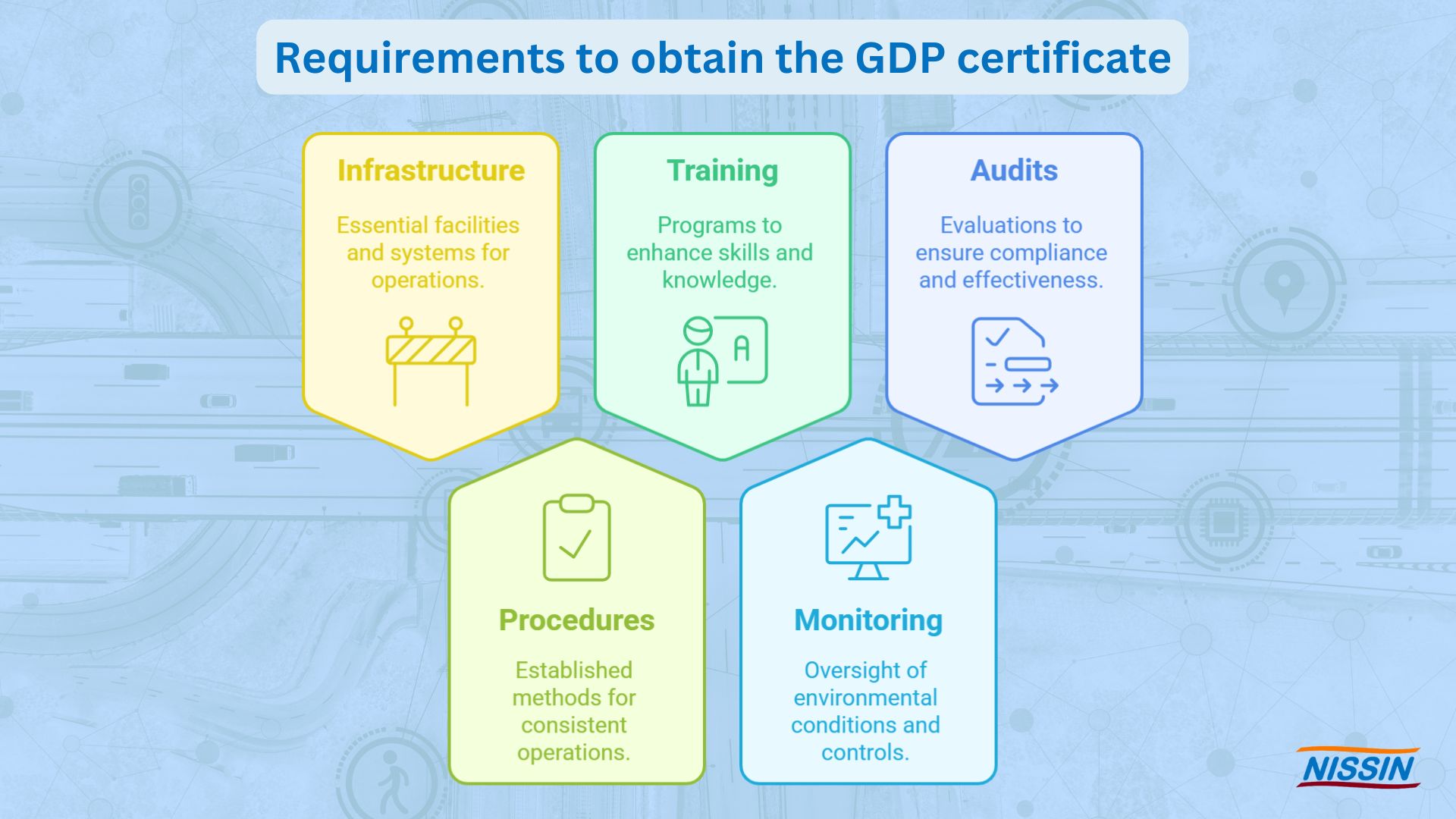The transport of products such as analgesics or vaccines require millimeter precision. A small error in the cold chain or an inadequate storage condition can compromise the efficacy of these products and even put the health of thousands of people at risk, which begs the question: how do you ensure that they meet strict storage and distribution standards? The answer lies in the GDP Certificate, which is essential to maintain the quality and safety of these products from the manufacturer to the end consumer. In this context, the GDP certificate has become a fundamental pillar to operate with this type of product.
Therefore, logistics companies are obliged to maintain a high standard of quality and safety in the distribution of products. Nissin Transport GmbH Succursal en España, with its long history in the logistics industry since 1988, understands the importance of complying with the strictest regulations to ensure the success and confidence of its customers.
So let’s look at what GDP certification is, why it is essential, how to obtain it and what benefits it brings to companies and consumers.
What is the GDP Certificate?
The acronym GDP stands for Good Distribution Practice and is defined as a regulation that governs the distribution conditions of products, especially in highly controlled sectors such as medicinal products for human use. This certificate ensures that products are managed correctly throughout their life cycle, from the manufacturer to the end consumer, with the aim of maintaining product quality, safety and efficacy.
The concept of “good distribution practices” was developed in the European Union and needs to be translated into national legislation. For example, the FDA in the United States also has similar regulations to ensure quality in the distribution chain of pharmaceutical and medical products.
Its purpose? To reduce risks in the transportation, storage and handling of products in order to ensure the integrity of the product until it reaches its final destination.
Why is GDP Certification Important?
GDP certification is essential to ensure that products maintain their quality and efficacy during distribution. In regulated sectors such as pharmaceuticals, certification is particularly important, as mishandling of products can have serious consequences for public health. In industries such as medical devices, proper handling also ensures consumer confidence and compliance with local and international regulations.
Benefits of the GDP Certificate
Obtaining this certification helps companies comply with regulations, while offering a number of key benefits, such as:
Regulatory Compliance and Legal Risk Reduction
The certificate guarantees that the company complies with all local and international regulations, which reduces the risk of sanctions, fines or litigation.
Improved Operating Efficiency
Standardizing processes and improving infrastructure to meet GDP increases operational efficiency, which translates into better inventory control and reduced errors.
Strengthening Competitiveness
GDP-certified companies can access international markets, where regulations are stricter and competition is greater.
Customer Confidence
Having a GDP certificate reinforces the company’s image, as it demonstrates that it is committed to safety, quality and best practices in distribution.
Finally, certification demonstrates accountability and transparency, which strengthens the relationship with customers, suppliers and other stakeholders. Full traceability of the product from its origin to its final destination improves transparency and increases customer confidence in distribution services.
Requirements to Obtain the GDP Certificate
To achieve certification, a series of requirements must be met to ensure that product distribution processes are safe, efficient and in compliance with established regulations:
Adequate Infrastructure
Storage facilities must meet strict safety and hygiene standards and have adequate equipment to control temperature and humidity when necessary.
Documented Procedures
Every organization should have formalized processes that establish how each type of product should be handled, stored and transported. In addition, they must be accessible and understandable to all personnel involved.
Training
Distribution personnel should receive ongoing training on GDP regulations to ensure that they comply with the required standards and procedures.
Monitoring and Control of Environmental Conditions
Depending on the type of product, specific storage conditions may be required, such as temperature control or humidity.
Audits and Inspections
Strict GDP certification standards require all companies to undergo regular audits and to demonstrate compliance with regulations through internal and external inspections.

Process for Obtaining the GDP Certificate
The process of obtaining the GDP certificate may vary depending on the certifying entity and the nature of the company, but generally follows a series of steps:
Initial Evaluation
First, a test is performed to determine whether the company meets the prerequisites and regulations established for obtaining the certificate. The professionals in charge will analyze the infrastructure, processes and internal policies.
Improvement Implementation
If deficiencies or areas for improvement are identified, the necessary changes should be implemented to comply with the GDP. For example, an upgrade of facilities, improvement of operating procedures or additional training of personnel may be required.
Internal Audit
Prior to the official inspection, the company must conduct an internal audit to ensure that all processes comply with GDP regulations.
Official Inspection
The certifying agency conducts an official inspection to verify that all requirements are adequately met. This may include site visits, interviews with personnel and review of documentation.
Obtaining the Certificate
The last step, if the company passes the inspection, is the granting of the GDP certificate, which is valid for a determined period, generally 3 years, after which a new audit will be necessary to maintain the certification.
Consequences of Not Having the GDP Certificate
The lack of this certification can have repercussions, for example, problems in accessing international markets.
Many international markets only allow the distribution of products if the organization is GDP certified. Without this certification, business opportunities may be lost and global expansion may be limited.
Likewise, not having this certificate may raise concerns among customers, potentially making it more challenging to secure important contracts and maintain steady sales.
Your Success is Our Mission
The importance of the GDP certificate for any company dedicated to the distribution of pharmaceutical products for human use is indisputable. That is why at Nissin Transport GmbH Sucursal en España we are always up to date with the latest regulations to ensure that we can meet all our commitments.
This has earned us an unrivaled reputation in logistics and has positioned us as one of the leaders in the industry. If you are looking for a reliable partner that can meet your transportation goals, you can count on us. Contact our team so we can start working together to ensure the success of your business.





